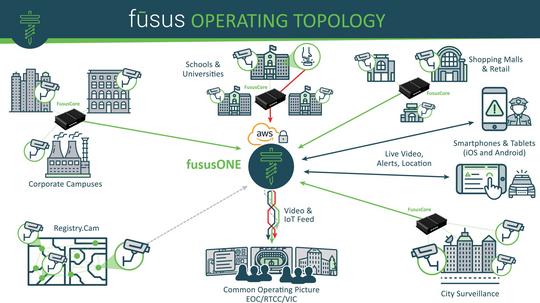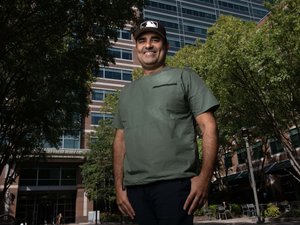
Books like "1984" and movies like "Eagle Eye," might make you believe Big Brother's eye in the sky is always watching. But believe it or not, video surveillance is not as advanced as we might think.
Atlanta-based Fusus, a software platform for public and private video surveillance that gives direct access to law enforcement on one common interface, is trying to drive the balance between safety and privacy in the digital age.
Chris Lindenau, CEO of Fusus, said despite the thousands of cameras we see on the street, in businesses, at the bank, even at work, those cameras are not typically accessible to law enforcement---unless, of course, police have probable cause to obtain a warrant for the video.
"The problem that we’re solving is the lack of information on the part of first responders in dealing with emergencies," he said. "(For example, when there’s an active shooter at a school), the vast majority of school videos are not accessible to law enforcement."
To date, Fusus has linked 12,874 cameras to its platform to help law enforcement protect more than 8 million people, according to its website.
Lindenau, whose background is in the bodycam industry, said this problem is a two part issue: technological and proprietary. To date, Lindenau said most law enforcement don't have access to a single interface with video streaming in real-time during emergencies. Police would also be required to receive permission from businesses and organizations operating these cameras to connect them to an interface. That's where Fusus does the legwork.
By combining public and private video sources, first responders have a better chance of knowing what's happening at a scene in real-time, rather than relying on the limited information from 911 callers. Lindenau said all of law enforcements access on the Fusus system is tracked, and businesses can decide whether to allow constant streaming to the Fusus system or only when a panic alert is triggered in the event of an emergency.
"By addressing (these technological and policy hurdles for law enforcement), we make communities safer," he said. "In this day and age, every mayor, every politician, everyone understands the need."
The idea for Fusus came to Lindenau while he was still working on the bodycam side of the business and through his discussions with law enforcement. He discovered the city of Minneapolis had built a platform to filter in hundreds of video sources for the Super Bowl in 2018.
"I can’t believe they had pulled this off in a matter of months," he said. "It would have taken any other software company years and a couple hundred thousand dollars ... If more agencies knew about this, this could really be something that was impactful for the country."
For naysayers with privacy concerns, Lindenau said privacy is just as important to Fusus as safety.
"When I hear 'Minority Report,' I always think about the ... balance that we in the technology sector reconcile between what is enough information to save lives --- to stop things such as the Dayton, Ohio shooting, to mitigate things like the El Paso mall shooting, to prevent active shooters in schools --- and too much information, which can infringe on people’s privacy rights," he said. "That’s why I think the privacy policy sharing component is such a critical part of our value proposition. It’s not enough to just say you fixed the problem with giving access to video sources. There has to be a discussion around, 'Under which conditions do we share (this data)?' And that’s where I think this technology will continue to evolve."
Fusus recently closed an oversubscribed Series A funding round, Lindenau said. The business has also seen a growing want for their product in other cities and municipalities.
"2020 is going to be visiting a lot of cities, doing a lot of deployments," he said. "We’ve got several on the way. In just Q1 alone, we’ll be in 15 more cities, by the end of the year, close to 100 cities around the country."








